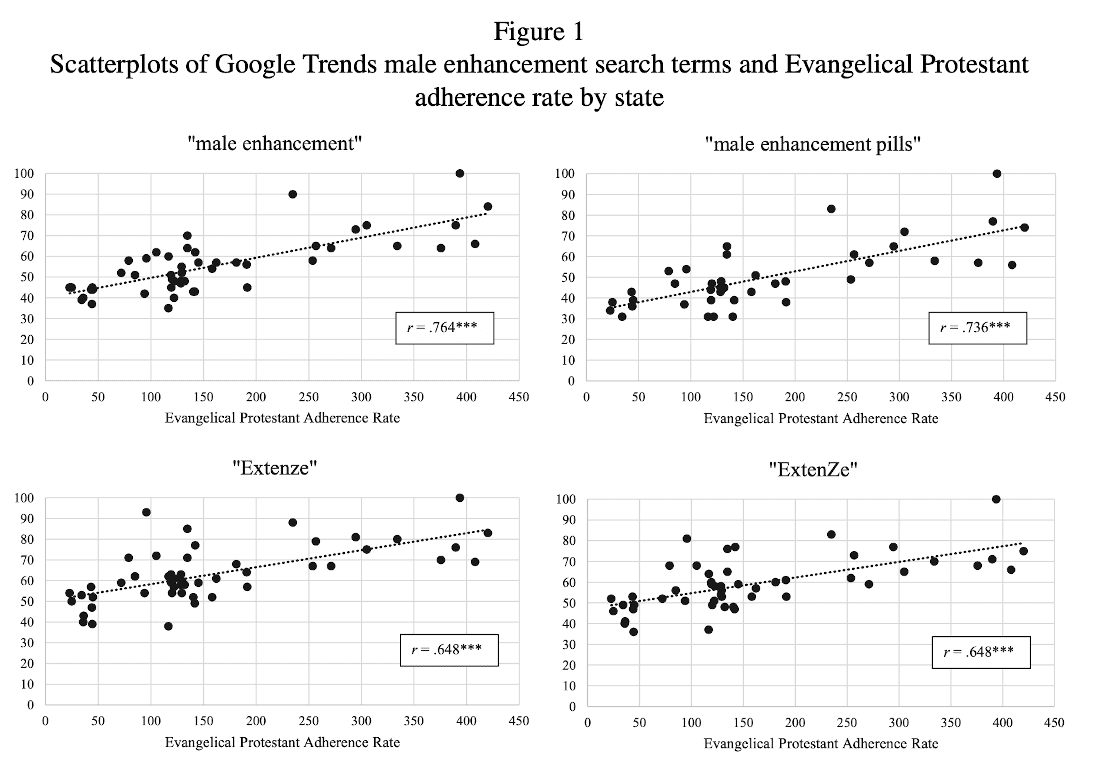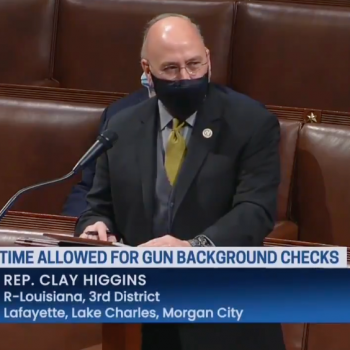There’s a “strong association” between the number of evangelical Christians in a state and the number of Google searches in those states that have to do with wanting a bigger penis.
A lot of Christians, apparently, want to compete with a risen Christ.

That’s the takeaway from researchers Samuel L. Perry and Andrew L. Whitehead in a paper just published in the Journal for the Scientific Study of Religion. It’s titled “Linking Evangelical Subculture and Phallically Insecure Masculinity Using Google Searches for Male Enhancement”… which is a very polite academic way to say there’s a connection between evangelicals and men who want bigger dicks.
Perry and Whitehead know that it’s tough to get an honest assessment of traditional masculinity in a survey because a lot of participants may be too embarrassed to answer honestly. (How many would confess to searching online for male enhancement drugs?) But while people might lie to researchers, they’re probably not going to lie to Google. So using Google Trends, which analyzes searches, the researchers figured they could get a better accounting of what people were actually looking up online in different states. So focusing on terms like “male enhancement,” “ExtenZe,” and “penis pump” while connecting them with the “preponderance of evangelicals in a state” was one way to judge the (uh) penetration of Christian masculinity.
If you’re curious, the numbers on the x-axis represent the number of evangelical Protestants per 1,000 people in a state. Alabama, for example, has about 420.4 evangelicals per 1,000 people. The Google Trends number represents how popular a search term is, with 100 being the highest.

Simply put — even after accounting for factors like political preference, education, race, and marriage status in each state — having more evangelicals around you makes it more likely that the number of searches for those male enhancement terms will… go up. (Can’t argue with hard data.)
Indeed, scholars argue this effort to equate Christian masculinity with (phallocentric) size and strength has grown progressively more radicalized as evangelical men internalize these values, increasingly perceive threats to their patriarchal hegemony, and begin to worry they cannot live up to the standards of the strong, dangerous, virile man…
…
Our findings provide important insight beyond the potential psychic damage that could be associated with subcultural views that equate masculine worth with physical size and strength either centering on or symbolized by the penis. At minimum, a higher prevalence of searches for male enhancement terms like “penis enlargement” and “male enhancement” (though these searches could also be performed by women) mean men in that region not only feel that having a larger penis is important, but that their penis does not measure up. This is perhaps the very archetype of masculine insecurity.
Obviously, a study like this has serious limitations. We don’t know if it’s men looking up these terms. We don’t even know if it’s evangelicals. Without more fine-tuned data, which is currently unavailable, it’s hard to draw a more solid line. The researchers fully acknowledge this throughout the paper. What they’re suggesting here is one way to look at the data while setting the stage for further exploration in the future.
But there sure seems to be some connection between a Christian culture that teaches people to honor traditional “manhood” and a desire to want a bigger penis — as if those two things are necessarily linked. They even point out one possible consequence of this kind of thinking:
… a subculture in which men not only elevate embodied measures of masculinity, but in which many men feel they are inadequate compared to the standard, is a subculture that may indirectly encourage abuse.
It’s not just churches that have this problem. We see the same kind of thinking in conservative politics. But church leaders always make it very clear they believe they’re on some moral high ground. Unless they understand the problems this kind of mentality creates, there’s no chance they’re going to solve them.
(Image via Shutterstock)




It’s Moving Day for the Friendly ..."
It’s Moving Day for the Friendly ..."
It’s Moving Day for the Friendly ..."
It’s Moving Day for the Friendly ..."